How is monotheism addressed in ancient Hermetism? The Corpus Hermeticum and other Hermetica talk about God all the time, so let’s take a look at the Hermetic views on God and what monotheism means to this classical religion.
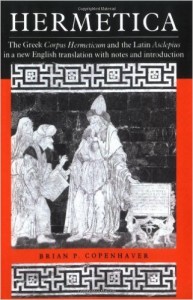 Scholars have been working to categorize the various views of God and divinity in the Hermetica for years. There are two general categories that most use: optimistic monist and pessimistic dualist. An optimistic view would focus on the good and worthy parts of the cosmos and creation, thus deducing that all of creation was part of a good and benevolent deity. This monism ends up being described in book I of the Corpus Hermeticum in a way that is panentheistic, meaning that all of the cosmos is part of God, but that God also exists beyond the cosmos.
Scholars have been working to categorize the various views of God and divinity in the Hermetica for years. There are two general categories that most use: optimistic monist and pessimistic dualist. An optimistic view would focus on the good and worthy parts of the cosmos and creation, thus deducing that all of creation was part of a good and benevolent deity. This monism ends up being described in book I of the Corpus Hermeticum in a way that is panentheistic, meaning that all of the cosmos is part of God, but that God also exists beyond the cosmos.
The pessimistic dualist view would treat the world as base, evil, and unworthy of the divine. In this view, God is seen as apart from the cosmos, and the path to gnosis, or knowledge of God, comes from forsaking the material world and focusing on the spiritual.1 The pessimistic dualist point of view is poignantly outlined in book VII, which states, “The vice of ignorance floods the whole earth and utterly destroys the soul shut up in the body, preventing it from anchoring in the havens of deliverance.”2
It is possible that these two views are related. In fact, it could be that the pessimistic view is a development of the optimistic view once a certain level of spiritual development is seen.
Monotheism and Henotheism
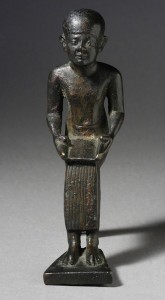
Asclepius is traditionally associated with the Egyptian god Imhotep.
It is easy to anger the terrestrial and material gods since they have been made and put together by men, from both divine and human natures.
Asclepius 375
Asclepius also discusses other gods. However, these gods are mostly man-made. Hermes explains that both he and Asclepius are descended from ordinary men who were eventually revered as gods by the Egyptians. Hermes states plainly, “Thus man is the creator of gods.”6 This seems to indicate that Hermetism had at least three different levels of divinity. First, there is the unreachable, unknowable God, sometimes called the Supreme Good. Second, there are the divine emanations from God which aided in creation, such as in book I of the Corpus Hermeticum. Finally, there are the man-made gods, such as the grandfathers of Asclepius and Hermes, who are worshiped by men in the form of idols.
One God Matters Most
Throughout the path of initiation laid out in the Hermetica, it eventually becomes clear that the Supreme Good is the God that matters the most. Book XIII talks about a spiritual rebirth, wherein the initiate becomes “born in Nous” and spiritually united with the the original uncreated God.7
This is rebirth, O son. […] This is the gift of the teaching on rebirth, which I have expounded, so that we do not misrepresent the All to the many, but give it to those whom God Himself wills.
Corpus Hermeticum XIII.13
Though other gods are mentioned throughout the Hermetica, almost all of them are part of the created world. These lesser gods aren’t as important to the Hermetist, whose primary goal is rebirth in the Supreme Good who exists beyond the spheres of the created world. Though Hermetism may waffle between monism and dualism, and though it flirts with henotheism, the monotheistic elements are strongly emphasized throughout.
Did you like this article? My patrons received new articles up to five days early. Support my work on Patreon!

Copenhaver, Brian P. Hermetica: the Greek Corpus Hermeticum and the Latin Asclepius in a New English Translation, with Notes and Introduction. Cambridge, England: Cambridge University Press, 1992. xxxix. ↩
Corpus Hermeticum VII.1. ↩
American Heritage Dictionary of the English Language, Fifth Edition. S.v. “henotheism.” Retrieved April 19 2016 from http://www.thefreedictionary.com/henotheism ↩
Corpus Hermeticum I.9-15. We will discuss Hermetic creation myths at greater length in another article. ↩
Salaman, Clement, trans. Asclepius: The Perfect Discourse of Hermes Trismegistus. London: Duckworth, 2007. 93-4. ↩
Asclepius 38. ↩
Corpus Hermeticum XIII.2-6. ↩


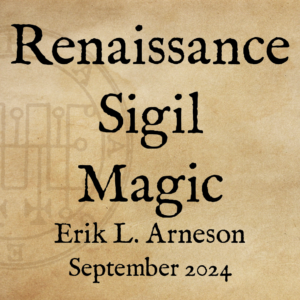
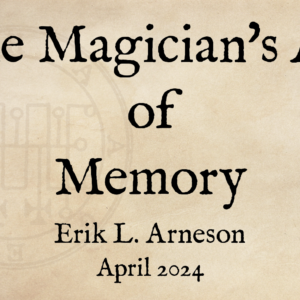
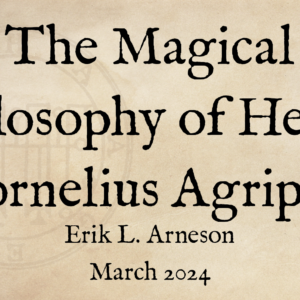
[…] Asclepius is actually a descendant of the deified Asclepius-Imhotep. As Hermes explains the nature of the gods, he […]
[…] can be viewed as a collective of all elements of the microcosm. But it can also represent a sort of divine blueprint, the plan by which creation occurs and the Cosmos continues to happen. The Hermetic axiom reflects […]